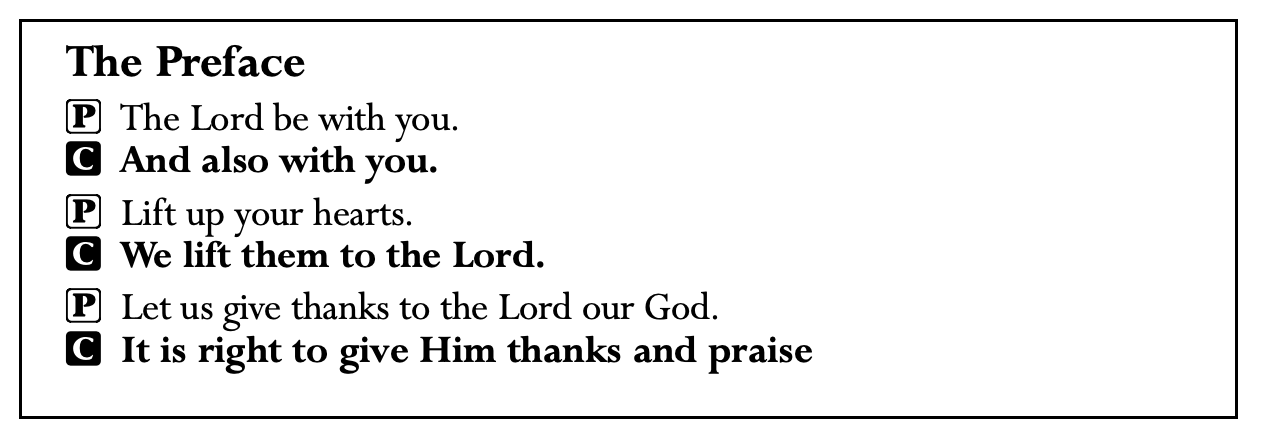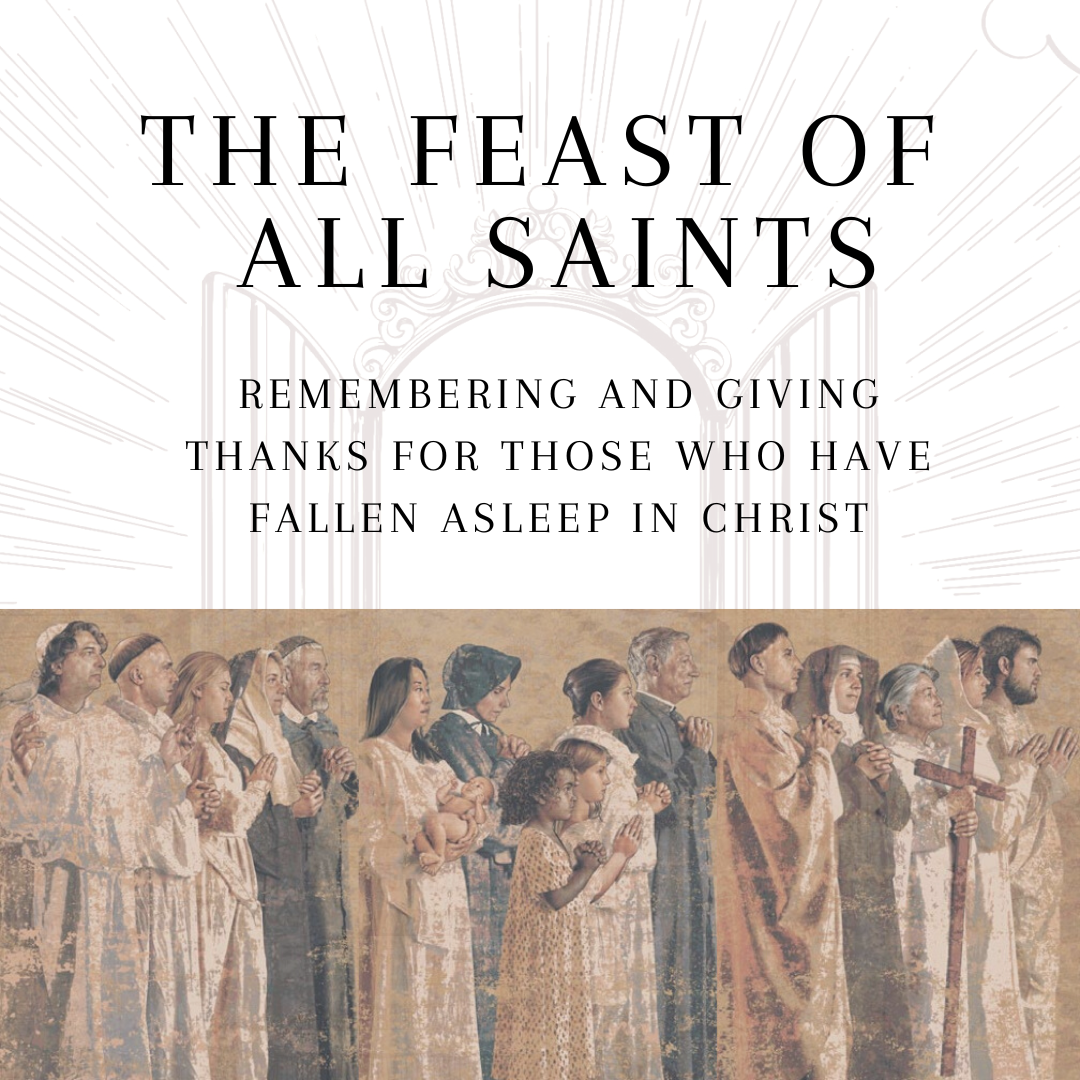Introduction
The Eucharistic prayer opens with a three-part dialogue that has been recited in the Church since at least the third century. This dialogue is first reported in the Eucharistic prayer of St. Hippolytus (c. A.D. 215). Now, eighteen centuries later, we continue to say the same words, uniting us with the Christians of the early Church.
The Lord’s Presence
The opening exchange (“The Lord be with you… and also with you/spirit.”) we have heard before. It is used in the introductory rite of the start of the Divine Service just before the reading of the Scriptures. Greetings like this were used through Scripture to address those whom God called to an important but daunting missions. Isaac (Gn 26:3, 24) and Jacob (Gn 28:13-15); Moses (Ex 3:12) and Joshua (Josh 1:5, 9); Gideon (Jgs 6:12), King David (2 Sam 7:3), and the prophet Jeremiah (Her 1:6-8), and the Blessed Virgin Mary (Lk 1:28). All of theme heard this message at pivotal moments in their lives. They needed the Lord to be with them as they set out on their charge.
Here, the greeting is fittingly repeated as we embark upon the most sacred part of the service: the eucharistic prayer. Both the pastor and the people need the Lord to be with them as they prepare to enter the mystery of Holy Communion.
Question: Why is it important that we are reminded of God’s presence with us?
Lifting Our Hearts
Next, the pastor says, “lift up your hearts” (Latin: literally, "Upwards hearts"). This prayer brings to mind the exhortation in Lamentations 3:41, “Let us lift up our hearts and hands to God in heaven.” What does it mean to “lift up” our hearts?
In the Bible, the heart is the hidden center of the person from which one’s thoughts, emotions and actions originate. All intentions and commitments flow from the human heart. Therefore when you are invited each week to “lift up your hearts,” we are being summoned to give our fullest attention to what is about to unfold. This is a wake up call to set aside all other concerns and focus our minds, wills, and emotions - our hearts - on the sublimity (grandeur, beauty, excellence) of what is happening in the Eucharistic prayer.
This summons is reminiscent of St. Paul’s words to the Colossians 3:1-2, “If then you have been raised with Christ, seek the things that are above, where Christ is, seated at the right hand of God. Set your minds on things that are above, not on things that are on earth.” Just as Paul called the Colossians to seek the “things above, where Christ is,” so are we bidden to direct our entire being towards the things of heaven, for that is where Christ is. And that is where we are going in the Eucharistic prayer.
Our Fullest Attention
St. Cyprian (d. A.D. 258), a North African Church Father, explained how this prayer draws our attention away from worldly distractions and is meant to lead us to ponder the awe-inspiring action taking place in the Eucharist prayer:
“Moreover, when we stand praying, beloved brethren, we ought to be watchful and earnest with our whole heart, intent on our prayers. Let all carnal and worldly thoughts pass away, nor let the soul at that time think on anything but the object only of its prayer. For this reason also the priest, by way of preface before his prayer, prepares the minds of the brethren by saying, Lift up your hearts, that so upon the people's response, We lift them up unto the Lord, he may be reminded that he himself ought to think of nothing but the Lord.”
Another Church Father, St. Cyril of Jerusalem, made a similar point and warned believers of the seriousness of this moment:
“Lift up your hearts: for in this sublime moment the heart should be lifted up to God, and not be allowed to descend to the earth and to earthly concerns. With all possible emphasis the priest exhorts all in that hour to dismiss all cares of this life, or household anxieties, and to have their heart in heaven with the merciful God. Then you answer, We lift them up unto the Lord: assenting to it, by your avowal. But let no one come here, who could say with his mouth, We lift up our hearts unto the Lord, but in his thoughts have his mind concerned with the cares of this life.”
Cyril goes on to acknowledge that being attentive to the Lord is something we should do always, but is difficult because we are fallen and weak. Yet if there ever is a moment to concentrate most intently and give God our fullest attention, it is now at the Eucharist prayer: “We should, indeed think of God at all times, but this is impossible because of our human frailty; but in this holy time especially our hearts should be with God.”
Question: Why can it be difficult for us to keep our minds and hearts focused on Christ?
Giving Thanks to God
In the last exchange the pastor says, “let us give thanks to the Lord our God.”
As we have already expressed after each Scripture reading (“Thanks be to God”), thanksgiving is a common biblical response to God’s goodness and to His saving works in our lives. In fact, thanksgiving is (should be) the most basic posture of God’s people towards Him.
We are reminded to give thanks to the Lord and echo the similar exhortation found in the Psalms: “Give thanks to the Lord for He is good…” (Psalm 136:1-3; see also Ps 107:8, 15, 21, 31).
St. Paul similarly teaches that the Christian life should be marked by prayers of thanksgiving. We should be “abounding in thanksgiving” (Col 2:7), give thanks to God in all we do (Col 3:17) and “in all circumstances” (1 Thess 5:18, Phil 4:6), especially in worship. Read the following Scripture passages: 1 Cor 14:16-19; Eph 5:19-20; Col 3:16. Following this biblical tradition of offering prayers of thanksgiving, the congregation responding, “It is right to give Him thanks and praise.”
Question: What is the point of agreeing with the prayer and saying “it is right”? How does giving thanks for all God has given and done for us change our attitude and outlook on life?






